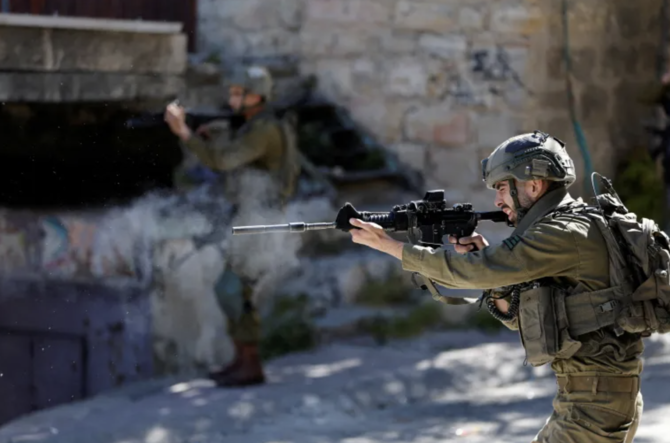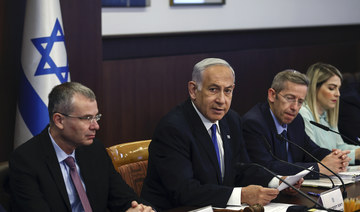RAMALLAH: Two-year-old Palestinian boy Mohammed Al-Tamimi, who was shot by Israeli troops in the occupied West Bank last Thursday, died of his wounds, health officials said on Monday.
The toddler was shot in the head in the village of Nabi Saleh, northwest of Ramallah.
Basem Naim, the head of the political department of Hamas in the Gaza Strip, described the killing of Al-Tamimi as state terrorism.
Mustafa Al-Barghouti, secretary-general of the Palestinian National Initiative Party, said that the killing of Al-Tamimi is an example of hundreds of crimes committed by the Israel Defense Forces against hundreds of Palestinian children.
He said Israeli violence must be deterred by sanctions and boycotts and and called for the soldiers and officers who committed the crimes to stand trial.
The shooting was the latest bloodshed in a surge of violence in the occupied West Bank and East Jerusalem.
Also on Monday, the Palestinians commemorated the 56th anniversary of the June 1967 Naksa when Israel seized the remaining Palestinian territories of the West Bank, East Jerusalem, Gaza Strip, as well as the Syrian Golan Heights and the Egyptian Sinai Peninsula in a six-day war.
Nineteen years earlier, in 1948, the state of Israel came into being in a violent process.
On the 56th anniversary of the Naksa, Palestinian experts reiterated their beliefs that the two-state solution is not possible anymore and that only a one-state solution is the future.
Nasser Al-Kidwa, the former representative of Palestine to the UN, told Arab News that the Palestinians had failed to achieve their national goals.
“We are far from achieving our national goals and have failed at all levels,” he said.
Ahmed Majdalani, minister of social development in the Palestinian Authority, disagreed with Al-Kidwa.
Majdalani told Arab News that the “resistance, sacrifices, and steadfastness of the Palestinian people had thwarted the Israeli occupation project to impose the Israeli vision on the Palestinian people, achieve the dream of Greater Israel, and achieve demographic change in the West Bank,” pointing out that Israel was forced to withdraw from the Gaza Strip in 2005.
He claimed that the Palestinian struggle had made a series of achievements since the setback in 1967.
He pointed to recognition of the Palestine Liberation Organization as the sole legitimate representative of the Palestinians, establishment of the Palestinian Authority on Palestinian lands, and 147 countries in the world recognizing Palestine as an observer state at the UN.
Ghassan al-Khatib, a Palestinian political analyst, told Arab News that Israel had not managed to swallow the West Bank 56 years after the setback, “and we have not succeeded in ending the occupation.”
Al-Khatib said that the Israeli goals were not achieved because the Palestinians had clung to their land and many did not migrate.
But Al-Khatib believes that the Palestinians are far from achieving their goal of establishing an independent state in the West Bank and Gaza Strip.
“Our goal is to prevent the success of the Zionist project in the rest of the Palestinian territories, to fight against the apartheid project, and to call for one state instead of the two-state solution, which is no longer possible to achieve,” he said.
“Despite the absence of allies and supporters for the Palestinians, they succeeded in preventing the Israelis from achieving their strategic goals in the West Bank.”
Ahmed Ghuneim, a prominent leader in the Fatah movement, told Arab News that Israel has not achieved any decisive military victory since 1967.
“As Palestinians, 56 years after the setback, we did not win, but we were not defeated because there are still about 7 million Palestinians living on the Palestinian lands, which thwarted the Zionist project’s claim that Palestine is a land without a people for a people without a land,” Ghuneim told Arab News.
He pointed out that the Palestinians did not leave despite 56 years of racist laws and ethnic cleansing by Israel, but that did not mean that the Palestinians had not suffered the consequences of the setback or continue to pay the price for it.
“Israel wants to resolve the conflict with the Palestinians by enacting racist laws to achieve what it did not seek to resolve militarily,” he told Arab News.



























